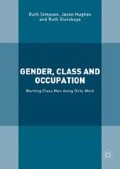Abstract
This chapter builds directly from our discussion in Chap. 3, Dirt in Material Worlds. At the conclusion of the previous chapter, we argued that since the early paradigmatic literature on dirty work, there has been something of a ‘return to the material’: a direct consideration of how ‘matter matters’ in the context of dirty work. We observed, nonetheless, that there are also problems with the materialist corrective, in particular the tendency to oscillate between the ‘material’ and ‘symbolic’ planes and facets of dirty work, first swinging the analytical pendulum one way, and then the other. As we argued in the conclusion to the previous chapter, the challenge of how to integrate a consideration of both planes within a unified scheme underpins our own attempts to advance a relational conceptualisation of dirt and dirty work. That undertaking is central to this chapter.
Access this chapter
Tax calculation will be finalised at checkout
Purchases are for personal use only
References
Alvesson, M., & Kärreman, D. (2001). Odd couple: Coming to terms with knowledge management. Journal of Management Studies, 38(7), 995–1018.
Alvesson, M., & Kärreman, D. (2011). Decolonializing discourse: Critical reflections on organizational discourse analysis. Human Relations, 64(9), 1121–1146.
Ashforth, B., & Kreiner, G. (1999). “How can you do it?” Dirty work and the challenge of constructing a positive identity. Academy of Management Review, 24(3), 413–434.
Ashforth, B., Kreiner, G., Clark, M., & Fugate, M. (2007). Normalising dirty work: Managerial tactics for countering occupational taint. Academy of Management Journal, 50(1), 149–174.
Bakhtin, M. (1981). The dialogical imagination. Austin: University of Texas Press.
Barad, K. (2003). Posthumanist performativity: Toward an understanding of how matter comes to matter. Signs, 28, 801–831.
Barad, K. (2007). Meeting the universe halfway: Quantum physics and the entanglement of matter and meaning. Durham: Duke University Press.
Bourdieu, P. (1977). Outline of a theory of practice. Cambridge, MA: Cambridge University Press.
Coole, D., & Frost, S. (2010). Introducing the new materialisms. In D. Coole & S. Frost (Eds.), New materialisms: Ontology, agency, and politics (pp. 1–43). Durham: Duke University Press.
Dick, P. (2005). Dirty work designations: How police officers account for their use of coercive force. Human Relations, 58(11), 1363–1390.
Douglas, M. (1966). Purity and danger: An analysis of concepts of pollution and taboo. London: Routledge.
Elias, N. (2012). On the process of civilisation (S. Mennell, E. Dunning, J. Goudsblom, & R. Kilminster, Eds.). Dublin: UCD Press. (Collected Works, vol. 3). (First published in German (1939) Über den Process der Zivilisation. (2 vols). Basel: Hans zum Falken; earlier English editions published by Blackwell (2 vols) 1994 and 2000 (both in one vol.)).
Foucault, M. (1972). The archaeology of knowledge. New York: Harper and Row.
Hardy, C., & Phillips, N. (1999). No joking matter: Discursive struggle in the Canadian refugee system. Organization Studies, 20(1), 1–24.
Hardy, N., & Thomas, R. (2015). Discourse in a material world. Journal of Management Studies, 52(5), 680–696.
Hook, D. (2007). Foucault, psychology and the analytics of power. Basingstoke: Palgrave Macmillan.
Hughes, E. (1958). Men and their work. Glencoe: Free Press.
Kreiner, G. E., Ashforth, B. E., & Sluss, D. M. (2006). Identity dynamics in occupational dirty work: Integrating social identity and system justification perspectives. Organization Science, 17(5), 619–636.
Maguire, S. (2004). The coevolution of technology and discourse: A study of substitution processes for the insecticide DDT. Organization Studies, 25(1), 113–134.
Mauthner, N. (2015). ‘The past was never simply there to begin with and the future is not simply what will unfold’: A post humanist performative approach to qualitative longitudinal research. International Journal of Social Research Methodology, 18(3), 321–336.
Miller, D. (Ed.). (2005). Materiality. London: Duke University Press.
Orlikowski, W. J. (2007). Sociomaterial practices: Exploring technology at work. Organization Studies, 28(9), 1435–1448.
Putnam, L. (2015). Unpacking the dialectic: Alternative views on the discourse–materiality relationship. Journal of Management Studies, 52(5), 706–716.
Reed, M. (2000). The limits of discourse analysis in organizational analysis. Organization, 7, 524–530.
Reed, M. (2010). Is communication constitutive of organization? Management Communication Quarterly, 24, 151–157.
Thompson, P. (2004). Brands, boundaries and bandwagons: A critical reflection on critical management studies. In S. Fleetwood & S. Ackroyd (Eds.), Critical realism in action in organisation and management studies (pp. 54–70). London: Routledge.
Thompson, P., & Harley, B. (2012). Beneath the radar? A critical realist analysis of “the knowledge economy” and “shareholder value” as competing discourses. Organization Studies, 33, 1363–1381.
Tracy, S., & Scott, C. (2006). Sexuality, masculinity and taint management among firefighters and correctional officers: Getting down and dirty with “America’s heroes” and the “scum of law enforcement”. Management Communication Quarterly, 20(1), 6–38.
Tyler, M. (2011). Tainted love: From dirty work to abject labour in Soho’s sex shops. Human Relations, 64(11), 1477–1500.
Author information
Authors and Affiliations
Copyright information
© 2016 The Author(s)
About this chapter
Cite this chapter
Simpson, R., Hughes, J., Slutskaya, N. (2016). Dirt as Relational. In: Gender, Class and Occupation. Palgrave Macmillan, London. https://doi.org/10.1057/978-1-137-43969-7_4
Download citation
DOI: https://doi.org/10.1057/978-1-137-43969-7_4
Published:
Publisher Name: Palgrave Macmillan, London
Print ISBN: 978-1-137-43967-3
Online ISBN: 978-1-137-43969-7
eBook Packages: Business and ManagementBusiness and Management (R0)

